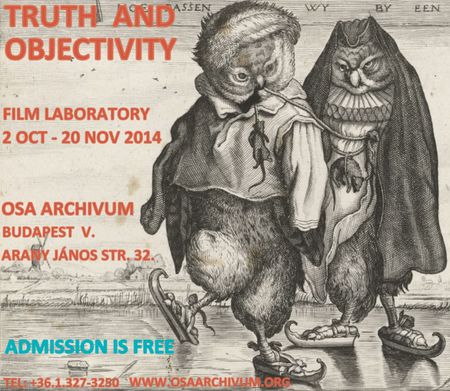Vera and Donald Blinken Open Society Archives
Truth and Objectivity – Film Laboratory
Film Laboratory
2 October – 20 November 2014
Join us for a unique film series to explore documentaries associated with historical truthfulness and objectivity. Various ways of investigating, revealing, and verifying truth are detailed in each film through uncovered footage, interviews, observations, or re-enactment of past events. Just as the filmmakers incorporate different approaches and methods, so these themes are echoed in the CEU course called, Historiography: Themes in Its History and Approaches to Its Theory .
Programmers: Ioana Macrea-Toma, István Rév and Zsuzsanna Zádori.
Free admission to all films!
Seating is on a first come, first served basis. Seats available from 5:30pm
Location: OSA Archivum at Central European University, 1051 Budapest, Arany János utca. 32.
Opening film: Thursday, 2 October at 6:00 pm
I, Pierre Rivière, Having Butchered My Mother, My Sister, and My Brother...
By René Allio, France, 1976
It is rare that a philosopher's inquiries into the mechanisms of truth-production take a visual form. Director, René Allio re-enacts an infamous pastoral crime from the 1830’s that interweaves Michel Foucault's reflections on the intersection of legal, psychiatric, and literary discourses in the handling the case. While focusing on locally embedded themes of governance and defiance, it is hauntingly relevant. (French with English subtitles, 130 min)
Next screenings:
Thursday, 9 October at 6:00pm
Echoes from a Somber Empire
By Werner Herzog, Germany, 1990
Echoes is Herzog’s utterly captivating jigsaw puzzle concerning Jean-Bédel Bokassa, the former dictator of the Central African Republic, and Michael Goldsmith, a European journalist captured and tortured by
Bokassa’s regime. As the historical narrative crisscrosses, a wildly complex, unforgettable portrait of a despotic madman bubbles to the surface. (French with Eng. subtitles, 91 min)
Thursday, 16 October at 6:00pm
Blockade / Блокада
By Sergey Loznitza, Russia, 2005
Blockade provides remarkable insight into the siege of Leningrad during the Second World War. (Silent, 52 min)
Respite / Aufschub
By Harun Farocki, Germany & South Korea, 2007
A close study of the surviving 16mm footage filmed by one of the inmates of the Westerbork camp in the Netherlands during World War II. The film discloses chilling details of everyday life at Westerbork, but also questions generally accepted visual understandings and impressions of the concentration camp system. (Silent, 40 min)
Thursday, 30 October at 6:00pm
The Act of Killing
By Joshua Oppenheimer, Denmark, 2012
Indonesian death squad leaders make a film about their past and killings. They write the script and play themselves in the film as well as their victims. Berlinale 2013 Audience Award
Indonesian with Eng. subtitles, 159 min (director’s cut)
Thursday, 6 November at 6:00pm
The Tailenders
By Adele Horne, 2006
"This gorgeous, inspired, and gutsy film...opens up new ideological vistas on religion, technology and globalization. It dares viewers not to be surprised by it." Virginia Heffernan, The New York Times (English subtitles, 70 min)
Thursday, 20 November at 6:00pm
Odessa
By Florin Iepan, Romania & Germany, 2010, Romanian with English subtitles, 52 min
Introduction by and discussion afterwards with Professor Constantin Iordachi, CEU, History Department
Florin Iepan embarks on a process to reveal the largest mass execution perpetrated by an ally of Nazi Germany in Odessa (now Ukraine) which should lead to a public debate about Romania’s fascist past and conclude with an official reaction on behalf of the Romanian people. At first hand, this seems to be an impossible mission. In a story full of spectacular turn of events, with the director in front of the camera, we discover his weaknesses, his doubts, the self-irony, the ups and downs of his campaign. Unorthodox measures are employed in order to put the topic on the public agenda. During four years of conferences, news coverage, TV programs and internet commentaries, Florin Iepan managed to attract hostility and hatred from thousands of Romanians and from public figures known for their anti-Semitic and nationalist opinions. At the same time he is encouraged by other fellow Romanians who understand that if we don’t act now, when the country faces an economic crisis and a weak democracy, history can repeat itself.
- - - - - - - - - - - - - - - - - - - - -
Free admission to all films!
Seating is on a first come, first served basis. Seats available from 5:30pm


